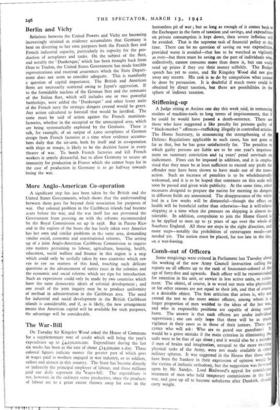The War-Bill
On Tuesday Sir Kingsley Wood asked the House of Commons for a supplementary vote of credit which will bring the year's expenditure up to k4,25o,000,000. Expenditure during the last six weeks has been at the rate of about £4,5oo,00o a day. These colossal figures indicate money the greater part of which goes in wages paid to workers engaged in war industry, or to soldiers, sailors and airmen in this country. The State has become directly or indirectly the principal employer of labour, and these millions paid out daily represent the wages-bill. The expenditure is not, however, in the ordinary sense productive, since the products of labour are to a great extent thrown away for ever in the
bottomless pit of war ; but so long as enough of it comes back to the Exchequer in the form of taxation and savings, and expenditure on private consumption is kept down, then severe inflation will be avoided. That is the supreme task of financial policy at this time. There can be no question of saving on war expenditure, provided waste is avoided—that has to be watched as vigilantly as ever—but there must be saving on the part of individuals who, collectively, cannot consume more than there is, but can easily send up prices if they use their money selfishly. The Budget speech has yet to come, and Sir Kingsley Wood did not give away any secrets. His task is to do by compulsion what cannot be done by persuasion. It is doubtful if much more could be obtained by direct taxation, but there are possibilities in the sphere of indirect taxation.


























 Previous page
Previous page